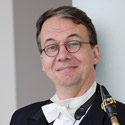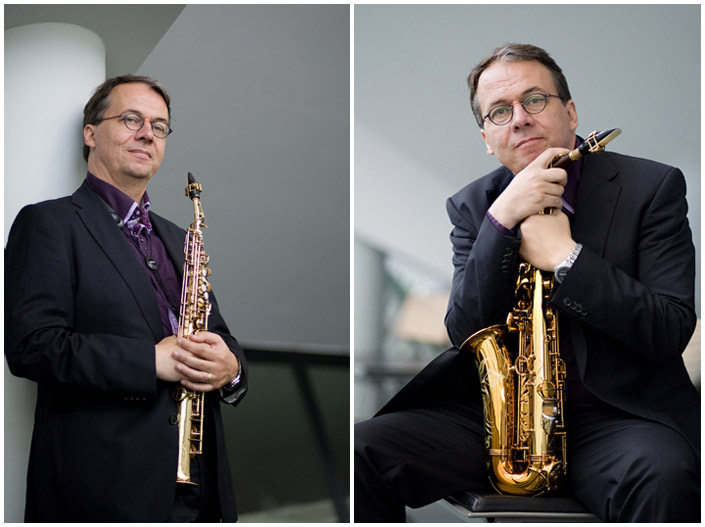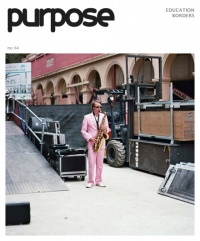
Interview
The language of music is universal...

Johan van der Linden, a member and a co-founder of the most well-known saxophone quartet in the world - Aurelia Saxophone Quartet. A professor in conservatories in Enschede and Utrecht in the Netherlands. A soloist and freelancer playing with the biggest Dutch and international orchestras. A teacher and a mentor. A composer and an arranger. An orchestra man with huge talent and passion.
Johan van der Linden graduated from musical studies with saxophone specialization in Sweelinck Conservatory in Amsterdam. He is the ambassador of the most prominent brands in the saxophone industry - Rico reeds and Selmer saxophones. Together with other famous musicians - Arno Bornkamp (alto saxophone), Willem van Mervijk (baritone saxophone) and Niels Bijl (tenor saxophone), he has formed the Aurelia quartet with great success for almost 30 years. The band was honoured with the Edison's award for the best recording of 1988. The quartet released 10 albums do far. Together with other members, Johan van der Linden wrote a handbook entitled: "Saxophone manual".You are a solo saxophonist, play in a quartet and teach. Is it easy to do all of this at the same time? Does one of them lose something because of the other, or maybe it gains something?
Joining these activities together is easy for me, because I develop constantly. Doing just one thing would be boring for me. When I do much - teach, compose or play - new and various ideas come to my mind. Such combination is perfect. It keeps me in good shape.
You mostly play the so-called classical saxophone music. Why?
Why not? Someone has to do it! [Laugh]. Perhaps the term "classical saxophone music" is bad. There is jazz, pop, classical music and many more genres. Yes, I play classical music as much as many other saxophonists. It is not strange when it comes to a saxophone. A saxophone was not originally created as a jazz instrument. Many people might think so, and that is why they do not know what it is really about. When the saxophone was invented by Adolf Sax in 1840, there was no jazz, there was just the music that today we call classical. For me, this is a very good reason for playing classical music on a saxophone.
Do you think that saxophone classics have a future? How do you see it from the perspective of a performer, teacher and mentor?
Why not? We have beautiful repertoire, even bigger than the flute or clarinet. OK, well, maybe not Mozart or Bach, but there are no reasons because of which we should not play this beautiful music. Maybe because of the fact that it is performed so rarely, we should play it.
From my experience I know that when I play, people who listen to it like the saxophone and its sound very much.
The saxophone class in conservatories in Enschede and Utrecht, where you teach, consists of students from different countries. Does such cultural diversity influence the development of these young people in a good way?
I think so. The language of music is universal, it unites many people all over the world. I really think that music brings peace to the world.
In these conservatories, you established the Artez/HKU Saxophone Orchestra, consisting of around 15 young musicians. What does it mean for a student to participate in this undertaking? Are there any similar groups in the Netherlands, outside universities and schools?
We are a unique band in the Netherlands. This year we perform in Utrecht, Rotterdam, Groningen, Enschede, etc. We play at a concert in Concertgebouw in Amsterdam - this is a huge success. In November, we are going to start recording in a professional studio. I organize this orchestra for all of my students each year. This orchestra is supposed to teach them how to play together and how to create music just like professional musicians. It is a good method of learning, but it is also not easy for everyone.
What are the perspectives of graduates of the saxophone class? Is it difficult to find a job after finishing studies in the Netherlands? And how does this look like abroad?
Yes, also in the Netherlands it is difficult to find a job. However, all of my graduates have good jobs. As you probably know, there are many foreign students in the Netherlands today, which means that there are less Dutch students. This results in the lack of professional saxophone teachers. In other countries, people from abroad rarely get a job. And yes, I sometimes receive job offers from other countries. However, I think I will stay in the Netherlands.
The Netherlands is a great country for musicians - we can do everything there. If you compare it to France, where the level of performing is very, very high, the possibilities of organising a good recital are much lower. And when you finally can perform, you have to play Beethoven or Mozart. Modern music is almost forbidden, and a kind of an underground has emerged, where actually only students come to perform and to listen. There is no such thing in the Netherlands. The Netherlands is an open country, although the audience is getting smaller. When I was a student, the audience was full, even when we were performing the most modern music of those times. The Netherlands was a paradise. This will change a bit

Do saxophonists enjoy playing in bands?
I do [laugh]. This is an interesting question. The thing that I experienced is the fact that students have difficulties with playing together. The first week is fine, but during the next month the bands fall apart - they do not like each other.
I have been playing in Aurelia for almost 30 years. We are not friends, we do not invite each other to birthday parties. We know everything about each other, but we are not friends. Thanks to this we can say to each other: you play badly, you cannot play, and his playing is boring. This is very important. Students have issues on the personal level, they cannot agree with each other. They cannot separate professionalism from private interests.
I think that playing chamber or band music is the richest way of creating music. Schools are poorly organised when it comes to chamber music. It is a very big problem. The level of chamber bands in the Netherlands is extremely high. It cannot be compared to the level of schools and universities. As teachers, we do not know why. Maybe it is because of the facts that young instrumentalists are not interested, they all are soloists.
There is a very interesting band in the Netherlands - Kalefax. None of its members know, what this name really means, but when they were wondering how to name their band, they looked out the window and saw a little boat with this name - and they thought that it was a good idea. The band consists of oboe, clarinet, bassoon, saxophone and bass clarinet. They created this band because they heard Aurelia playing, however, they did not have 4 saxophonists that would play together. So they started their own band, but they did not know what to play - they did not have their own songs. What did they do? They started writing them themselves. They compose, arrange songs written by other bands or order them from composers.
In this moment, Aurelia probably is the most well known saxophone quartet in the world. What in fact were the conditions for starting such band in the times, in which it was created, and what problems and facilities did you encounter in the space of passing years?
30 years have passed since we started playing together. The reason for starting the band was beautiful music. We were always colleagues, but never friends. This always allowed us to talk about music in a professional way. I know, we are lucky. We did not have any major problems. Everything that we wanted just happened to us. The thing that is important for our quartet is the fact that we have always wanted to do other things - teach, perform, solo, in bands, etc. Therefore, Aurelia is not the most important part of our careers, although playing in a quarter is a very interesting way of creating music.
Our quartet has been financially supported by the government for around 12 years, but since 2009 we have not received any money, because we are not a commercial project. They want a saxophone quartet to be aimed at huge audience. We do not aim at being popular, we just want to play as good as possible and create beautiful music - we do not think about huge audience.
Besides performing music, you also are an arranger and a composer. Where does the interest in this part of music come from? Does it result from the lack of repertoire, or maybe from sheer passion?
When I perform, I feel the need for improvising about what I am just playing. Some of these improvisations are really good and I write them down. Just like that. And then it turns out that some people want to play, and some others want to publish my music. Composing is like a therapy to me. Maybe more instrumentalists, performers should also do that. This has very interesting effects.
It also has some things in common with the quartet. When we started playing with Aurelia and looking for repertoire, new composers that would write for us, it was obvious to compose arrangements. Those were not just simple arrangements of Scott Joplin, they had to be special. And then I thought - why not go further? Maybe I should write something by myself from the beginning to the end?
Do you think that the 21st century is a good time for musicians who play saxophone? Do new opportunities appear?
21st century is great for every musician. However, sometimes I would like to live in a different era. Because of one simple reason - to see how others did it in those times. With a saxophone or without it.
This interview with Johan van der Linden, a saxophonist from the Netherlands, was conducted by Agnieszka Furmańczyk
Check the archive

no 64 April 2012
theme of the issue:
EDUCATION BORDERS
< spis treści
Article
From the Editors
Interview
The language of music is universal... - interview with Johan van der Linden, a saxophonist from the Netherlands - Agnieszka Furmańczyk
Presentation
Young, talented
Career in Culture
Go. Go fast. Go as soon as possible! - interviews with young artists Ola Niepsuj and Piotr Niepsuj - Agnieszka Furmańczyk
Cultural Industries
Skills issue - interview with Floris Solleveld, a documentalist from ELIA - European League of Institutes of the Arts - Agnieszka Furmańczyk





